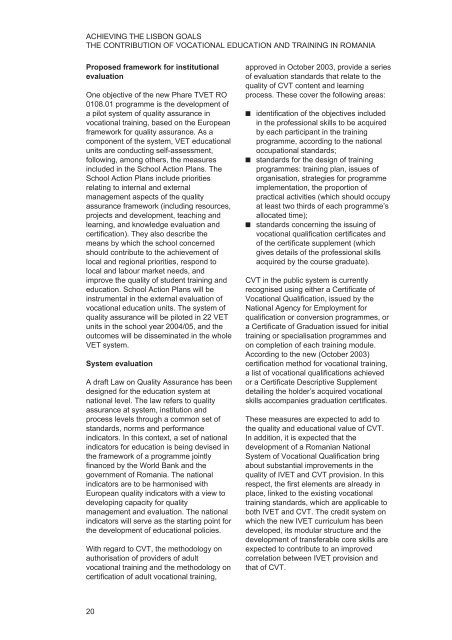PDF (222 KB) - Document Database website
PDF (222 KB) - Document Database website
PDF (222 KB) - Document Database website
Create successful ePaper yourself
Turn your PDF publications into a flip-book with our unique Google optimized e-Paper software.
ACHIEVING THE LISBON GOALS<br />
THE CONTRIBUTION OF VOCATIONAL EDUCATION AND TRAINING IN ROMANIA<br />
Proposed framework for institutional<br />
evaluation<br />
One objective of the new Phare TVET RO<br />
0108.01 programme is the development of<br />
a pilot system of quality assurance in<br />
vocational training, based on the European<br />
framework for quality assurance. As a<br />
component of the system, VET educational<br />
units are conducting self-assessment,<br />
following, among others, the measures<br />
included in the School Action Plans. The<br />
School Action Plans include priorities<br />
relating to internal and external<br />
management aspects of the quality<br />
assurance framework (including resources,<br />
projects and development, teaching and<br />
learning, and knowledge evaluation and<br />
certification). They also describe the<br />
means by which the school concerned<br />
should contribute to the achievement of<br />
local and regional priorities, respond to<br />
local and labour market needs, and<br />
improve the quality of student training and<br />
education. School Action Plans will be<br />
instrumental in the external evaluation of<br />
vocational education units. The system of<br />
quality assurance will be piloted in 22 VET<br />
units in the school year 2004/05, and the<br />
outcomes will be disseminated in the whole<br />
VET system.<br />
System evaluation<br />
A draft Law on Quality Assurance has been<br />
designed for the education system at<br />
national level. The law refers to quality<br />
assurance at system, institution and<br />
process levels through a common set of<br />
standards, norms and performance<br />
indicators. In this context, a set of national<br />
indicators for education is being devised in<br />
the framework of a programme jointly<br />
financed by the World Bank and the<br />
government of Romania. The national<br />
indicators are to be harmonised with<br />
European quality indicators with a view to<br />
developing capacity for quality<br />
management and evaluation. The national<br />
indicators will serve as the starting point for<br />
the development of educational policies.<br />
With regard to CVT, the methodology on<br />
authorisation of providers of adult<br />
vocational training and the methodology on<br />
certification of adult vocational training,<br />
approved in October 2003, provide a series<br />
of evaluation standards that relate to the<br />
quality of CVT content and learning<br />
process. These cover the following areas:<br />
<br />
<br />
<br />
identification of the objectives included<br />
in the professional skills to be acquired<br />
by each participant in the training<br />
programme, according to the national<br />
occupational standards;<br />
standards for the design of training<br />
programmes: training plan, issues of<br />
organisation, strategies for programme<br />
implementation, the proportion of<br />
practical activities (which should occupy<br />
at least two thirds of each programme’s<br />
allocated time);<br />
standards concerning the issuing of<br />
vocational qualification certificates and<br />
of the certificate supplement (which<br />
gives details of the professional skills<br />
acquired by the course graduate).<br />
CVT in the public system is currently<br />
recognised using either a Certificate of<br />
Vocational Qualification, issued by the<br />
National Agency for Employment for<br />
qualification or conversion programmes, or<br />
a Certificate of Graduation issued for initial<br />
training or specialisation programmes and<br />
on completion of each training module.<br />
According to the new (October 2003)<br />
certification method for vocational training,<br />
a list of vocational qualifications achieved<br />
or a Certificate Descriptive Supplement<br />
detailing the holder’s acquired vocational<br />
skills accompanies graduation certificates.<br />
These measures are expected to add to<br />
the quality and educational value of CVT.<br />
In addition, it is expected that the<br />
development of a Romanian National<br />
System of Vocational Qualification bring<br />
about substantial improvements in the<br />
quality of IVET and CVT provision. In this<br />
respect, the first elements are already in<br />
place, linked to the existing vocational<br />
training standards, which are applicable to<br />
both IVET and CVT. The credit system on<br />
which the new IVET curriculum has been<br />
developed, its modular structure and the<br />
development of transferable core skills are<br />
expected to contribute to an improved<br />
correlation between IVET provision and<br />
that of CVT.<br />
20








